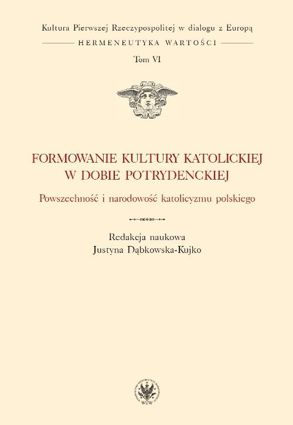Dawne i nowe. Tożsamość wyznaniowa katolików świeckich w potrydenckiej Rzeczypospolitej
Old and new. Religious identity of lay Catholics in the post-Tridentine Commonwealth
Author(s): Mirosława Hanusiewicz-Lavallee
Subject(s): Cultural history, Studies of Literature, Theology and Religion, Theory of Literature
Published by: Wydawnictwa Uniwersytetu Warszawskiego
Keywords: Sarmatian piety; counter-reformation in Poland; post-Tridentine religiosity
Summary/Abstract: Volume VI of the series shows not only the peculiarity of the religious culture of the First Polish Republic, the character and specificity of the "Sarmatian" piety, but also reveals the basic paths of development of this culture in connection with the thought developed in parallel by Catholic thinkers and writers in Western Europe. The research focused on the issues of opening up Polish post-Tridentine culture to the dynamics of the development of religious thought in other European countries, the ability to conduct dialogue with a foreign culture, and the possibility of adaptation, assimilation and transformation of foreign theories or ideas for the needs of indigenously Polish culture. The authors of individual dissertations try to answer the questions, on the one hand, about the scope and degree of involvement of Poles in the process of the renewal of Catholicism in Europe, about their participation in European discussion forums, about the knowledge of the Sarmatians' writings and the impact of these writings in the model of the post-Tridentine renewal of the Church and Catholic religious culture, on the other hand - about the ways of fresh counter-reformation ideas entering the Republic of Poland, the absorption, demand and methods of introducing conciliar decisions into the practice of religious life and the literature of the post-Tridentine times. The 12-volume series of the monograph Kultura First Rzeczpospolitej in dialogue with Europe. The Hermeneutics of Values presents the cultural heritage of the 15th and 18th centuries as an integral but original part of European culture. The research goal is to identify the ways and forms of the mutual transmission of aesthetic, political and religious values and to present in a broad, multilateral comparative context the axiological structure of the Polish culture of old times. Cultural texts are examined from an internal perspective as records of acts aimed at understanding values, and from an external perspective as statements that join European literary-aesthetic, political and religious discussions. In an intense dialogue, the culture of the Republic of Poland shows not only a receptivity to new ideas, but also creativity and dynamics of action in Europe.
- Page Range: 103-144
- Page Count: 42
- Publication Year: 2016
- Language: Polish
- Content File-PDF

